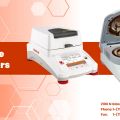The Benefits of Using Moisture Analyzers and Busting Myths About Their Application

Moisture is defined as the loss of mass seen when a sample is heated and is based, in principle, on the evaporation of water during the drying process; however, this measurement does not differentiate weight loss of water from loss of volatile components or sample breakdown. Moisture analyzers calculate a material's loss-on-drying by comparing the weight of a sample before and after heating. As a result, moisture content as measured by thermogravimetric methods encompasses all compounds that evaporate when a sample is heated and is quantified as weight loss during the healing process.
Moisture analyzers (or moisture balances) in the MB Series measure moisture Thermo gravimetrically. When utilising a thermogravimetric instrument, the phrase "moisture content" is used instead of "water content."
The Karl Fischer-type analyzer, which titrates KF reagent containing iodine to sample electro-chemically, is another technique of detecting moisture content. The Karl Fischer method allows for measurements ranging from a few ppm to 100% (water), however the operation is difficult and the device is costly, thus we advocate utilising moisture analysers.
4 Reasons Moisture Analyzers Should Be Trusted
1. Simple to Use
Moisture analyzers are simple to use in comparison to other approaches, such as wet chemistry or using an oven and a balance, which might take hours due to the complexities of the operation. Because of the intricacy of the water molecule and its strong intermolecular bonding capabilities, measuring moisture content in particular materials can be challenging.
2. Repeatable
Moisture analyzers are reproducible, but other techniques of determining moisture may result in mistakes such as moisture recovery after the sample has been heated and weighed. Because the portable moisture analyzer is a single device, it solves this issue.
3. Time-Efficient
Moisture analyzers measure moisture content quicker than most other methods. They dry a sample efficiently by transferring energy via radiation (the transmission of energy in the form of waves or particles across a medium—in this case, the sample) and convection (heat transfer by mass motion).
A traditional drying oven, on the other hand, primarily employs convection to dry a sample. Infrared energy is emitted by both metal and halogen heating components. The moisture analyzers are automated devices that combine a heating element operated by a microprocessor and an analyzer.
The moisture content of a sample may be determined in minutes rather than hours with such a device.
Versatile moisture analyzers can accept a wide range of materials and parameters. Moisture analyzers, for example, include storage and numerous ways for testing materials. A technique is a collection of parameters that govern how a sample is dried. It comprises a drying programme, temperature(s), and other parameters that specify how the results are shown, allowing you to find the optimum technique for drying a sample to get the desired outcome.
Debunking Some Common Moisture Analyzer Myths
● Myth: Moisture analyzers measure the amount of water in the air.
While some people assume that a loss-on-drying moisture analyzer analyses the moisture content of a sample, it really measures the weight change of the sample. Anything that evaporates, such as oils, fats, and other similar compounds, will be measured by a moisture analyzer.
Moisture analyzers are neither exact nor accurate, according to popular belief.
Truth: The fundamental objective of a moisture analyzer is to be precise—to generate a set of findings with very little fluctuation when many samples are tested under the same conditions.
To ensure accuracy, the user must choose a method and prepare the sample properly. Accuracy and precision are automatically assured when the samples are prepared the same way and the circumstances and parameters are the same.
Are you looking for a moisturiser analyzer? Contact us right away
Globallabsupply.com provides laboratory solutions that may assist you in assessing the quality of a sample, adjusting production techniques, and ensuring your goods comply with particular standards and laws. Visit our website to learn more about our moisture analyzers and other laboratory products.
Original Link: https://uberant.com/article/1816966-the-benefits-of-using-moisture-analyzers-and-busting-myths-about-their-applicati/
Other articles and publications:
Articles and publications of other companies:
 Protect Your Research & Experiments From Getting Polluted, Use The Best Horizontal Laminar Flow Hood
Protect Your Research & Experiments From Getting Polluted, Use The Best Horizontal Laminar Flow Hood
- +1 (714) 754-6660
- 2106 N Glassell St, Orange, CA, 92865, USA
- www.globallabsupply.com/Chairs-Stools-s/1825.htm



